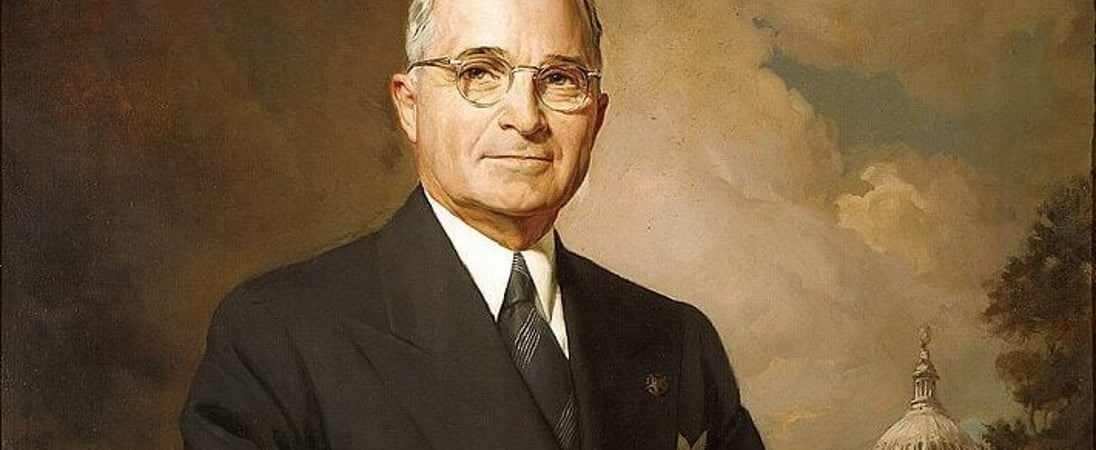
Harry S. Truman's birthday
Harry S. Truman, born on May 8, 1884, led a remarkable life of significant achievements. He rose from a modest background in Missouri to become the 33rd President of the United States.
Truman’s presidency, which lasted from 1945 to 1953, saw pivotal moments in world history, including the end of World War II.
He’s remembered for making tough decisions, such as using atomic bombs in Japan and establishing the Truman Doctrine during the Cold War.
Truman’s legacy is one of resilience and leadership during challenging times, impacting American history.
Harry S. Truman’s Early Life and Education
Harry S. Truman’s childhood in Missouri was humble and grounded. Born on May 8, 1884, in Lamar, he grew up on a farm in Independence.
His early years were filled with the routines of farm life, shaping his strong work ethic. Truman’s family moved to Independence when he was six, exposing him to a more urban lifestyle.
Despite financial struggles, his parents emphasized the importance of education and hard work.
In school, Truman was a diligent student. He loved reading and music, particularly interested in history and the piano. However, his formal education ended with high school.
Due to financial constraints, college wasn’t an option. Instead, Truman worked various jobs, including time on the family farm and clerical positions.
This period of his life was crucial in developing his character. Truman’s experiences taught him valuable lessons about perseverance and self-reliance.
These qualities later defined his approach as a leader and president. Despite lacking higher education, Truman’s keen interest in learning and reading kept him well-informed and intellectually engaged.
Harry S. Truman’s Triumphs and Milestones
Harry S. Truman’s journey from a modest upbringing to the pinnacle of American politics is a tale of grit and determination.
After working various jobs, Truman’s political career began in 1922 when he was elected as a county judge in Missouri. His fair and practical approach to local governance won him admiration and respect.
In 1934, Truman’s career took a significant leap as he became a U.S. Senator. During World War II, he gained national recognition for combating waste and inefficiency in war production, showcasing his commitment to integrity and accountability.
This reputation catapulted him to the role of Vice President under Franklin D. Roosevelt in 1944.
Truman’s most remarkable achievement came in 1945 when he assumed the presidency after Roosevelt’s death. His term was marked by momentous decisions and bold actions.
Truman played a pivotal role in ending World War II, notably by authorizing the use of atomic bombs on Japan. This controversial decision remains a subject of intense debate but undoubtedly changed the course of history.
Post-war, Truman focused on reconstructing Europe through the Marshall Plan, a critical move in stabilizing the region and curbing the spread of communism.
He also spearheaded the establishment of the United Nations and the NATO alliance, laying the groundwork for international cooperation in the post-war era.
Domestically, Truman’s presidency saw the integration of the armed forces and significant civil rights advancements. His push for the Fair Deal program aimed to improve social welfare, though it faced stiff opposition in Congress.
Truman’s tenure was also marked by the start of the Cold War. His Truman Doctrine defined U.S. foreign policy for decades, emphasizing support for countries resisting communism. His leadership during the Korean War further underscored his commitment to this doctrine.
Despite facing criticism and challenges, Truman’s presidency was a significant transformation and achievement period. His ability to make tough decisions in turbulent times left an indelible mark on American history.
Interesting Facts About Harry S. Truman
Artillery Officer in World War I: Truman served as an artillery officer during World War I. His leadership in the field earned him respect and recognition from his peers.
Piano Enthusiast: Truman was an avid piano player. He developed a passion for music early in his life, which he maintained throughout his presidency.
Mason Membership: Truman was a Freemason, eventually reaching the highest rank of 33rd degree Mason, reflecting his commitment to the organization’s values.
First Presidential Speech on TV: Truman was the first president to give a televised address from the White House, demonstrating his embrace of emerging technologies.
Established the CIA: He signed the National Security Act of 1947, which led to the creation of the Central Intelligence Agency (CIA).
Whistle Stop Campaign: In the 1948 presidential election, Truman conducted a ‘whistle stop’ campaign, traveling by train and speaking directly to the people, greatly contributing to his unexpected victory.
Desegregation of the Military: Truman signed Executive Order 9981 in 1948, initiating the desegregation of the U.S. Armed Forces, a significant step towards civil rights.
Two-Term Limit Advocate: He supported the 22nd Amendment, which limits U.S. Presidents to two terms. Ironically, he was the last president eligible to serve more than two terms but chose not to run again in 1952.
Also on this date...
No Socks Day
Go barefoot, dig out your sandals, or take the opportunity to stay home and let your feet relax, free of their usual prison of socks and constraining shoes.
World Ovarian Cancer Day
Research and spread awareness about ovarian cancer to help others recognize the dangers and signs early, and increase survival and recovery odds for many.
National Have a Coke Day
That effervescent beverage with the iconic red label, sparking joy and refreshment across generations with its timeless allure.
World Donkey Day
Visit a petting zoo, or simply do some research into the underappreciated, stalwart, useful and intelligent beasts of burden known as donkeys.




